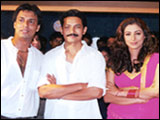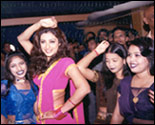


Salil Kumar
Let's raise a toast to Tabu for a rousing performance in Chandni Bar -- the story about a woman, indeed, hundreds of women who work in the dance bars of Bombay.
For the uninitiated, dance bars are watering holes where girls dance suggestively to an appreciative, and usually sloshed, male audience. The ambience is loud with psychedelic lights, painted faces and earsplitting music.
But fair warning: Unlike other films which fall apart in the second half, Chandni Bar is a slow starter. The question is, then, why watch this film?
There are three very good reasons:
One: Unlike other films which promise something new but are essentially rehashes, Chandni Bar is actually zara hatke. The whole idea behind the film is original. It may not get a ten on ten, but an effort has been made.
Two: Tabu. If there is one actress who can carry a film on her shoulders, it is Tabu. As usual, she sparkles. She is also probably the only actress who can stand out in a group of professional mourners -- that's no mean achievement.
 Three: The film gives a fair insight into the lives of the girls who dance in dance bars.
Three: The film gives a fair insight into the lives of the girls who dance in dance bars.
And so we have Tabu as Mumtaz. A girl who migrates to Bombay after communal violence in her Uttar Pradesh village kills her parents. Mumtaz's only relative, her uncle, accompanies her to the city and asks her to work at a dance bar till he gets a decent job.
That never happens. He takes to the bottle. Mumtaz finds herself being sucked into a world from which there is no escape. Worse, he rapes Mumtaz in a fit of drunken stupor.
Fate gives her another chance in the form of Pothya (a competent Atul Kulkarni), a hotheaded underworld character. He kills her uncle and marries Mumtaz. In course of time, they have a boy and a girl. Then, Pothya gets killed in a police encounter and Mumtaz, ridiculed by her husband's one-time friends and allies, is forced to join Chandni Bar again to make a living.
Cut to the late Nineties. The children are grown up. A not-so-youthful Mumtaz becomes a waitress in the bar. Her only hope is to see her children get a decent education and move on to respectable professions.
But her dreams are shattered once again when, one day, her son is caught for a crime he hasn't committed.

What happens next is better seen than read.
There are no songs in this film except those that play in the bar, ranging from hits of the Eighties' to the Nineties.
There is no Alps or Eiffel Tower to admire in Chandni Bar. The sets are cheap at best. Even the title of the film sounds tacky.
On the brighter side, however, nothing is out of place. The story is about dance bars and the girls who work in them -- therefore, everything is in consonance.
Will the film win a Filmfare Award? Certainly not. But it will certainly go places.
Even if it doesn't, what matters is an effort has been made to do something creative and different. In an industry which believes in assembly-line production, comes director Madhur Bhandarkar who is willing to experiment.
That, according to me, is the best thing about Chandni Bar.
ALSO READ:
Tabu on Chandni Bar
The Madhur Bhandarkar interview
Of slums, bar girls and Tabu